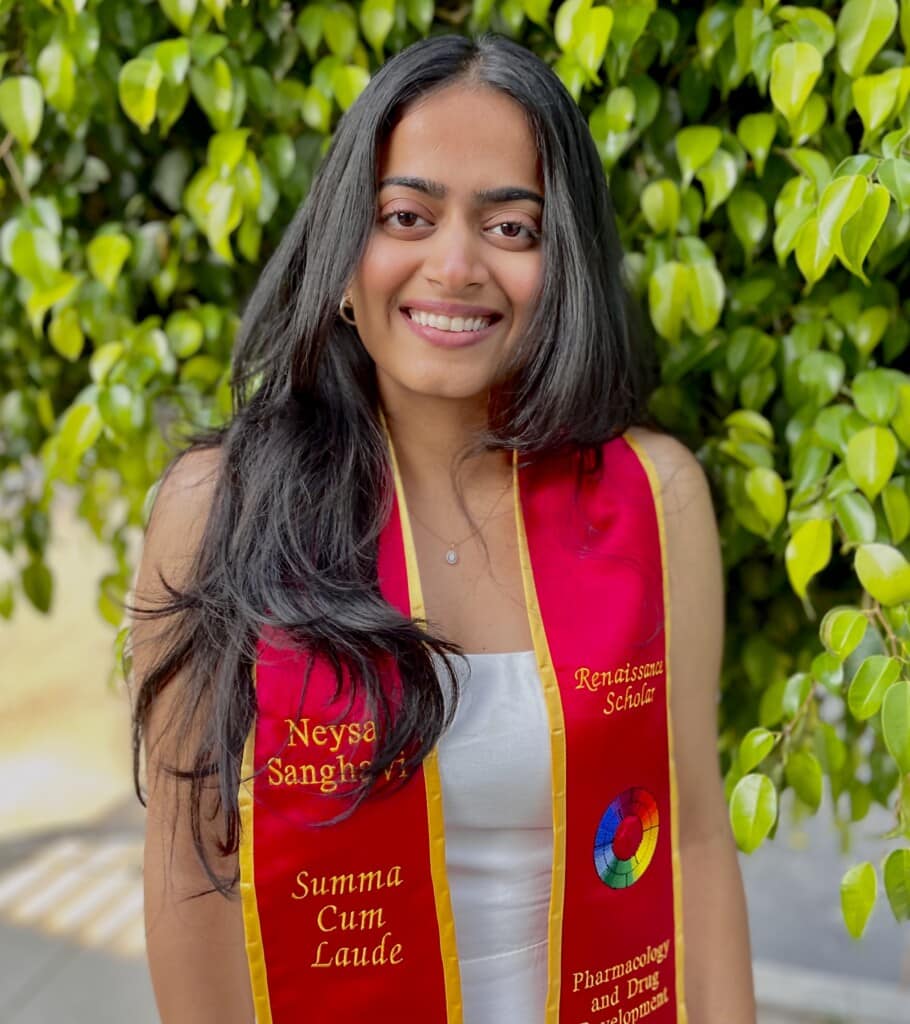COMMENCEMENT 2022: Service has been at the heart of the USC experience for Sanghavi, who next week will receive degrees in human biology and in pharmacology and drug development.
When Neysa Sanghavi arrived at USC from Mumbai, India, with a Dean’s Leadership Scholarship in 2018, she was already an accomplished humanitarian, conservationist, author and scholar. She had worked on turtle conservation in Costa Rica, researched HIV among former sex workers in India, and was named the youngest and first brand ambassador for Rwanda in India for her work with genocide survivors.
Now the co-director of Undergraduate Student Government’s Service Student Assembly, Sanghavi looks back on the last four years before earning her a bachelor’s in human biology from the USC Dornsife College of Letters, Arts and Sciences and a bachelor’s in pharmacology and drug development from the USC School of Pharmacy next week.
What have been the highlights and high points of your USC experience?
To be honest, any moment that made my parents proud has definitely been a highlight of my USC experience. One such moment would be when my name went on the USC Wall of Scholars at Leavey Library. Furthermore, I truly enjoyed the annual Catalina retreat the USC Sidney Harman Academy for Polymathic Study organizes. I made some of my closest friends there. My volunteer experiences through the Joint Educational Project [one of U.S.’ oldest and largest service-learning programs] and through the USC Volunteer Center have had a significant impact on how I see myself. They made me realize that I am a proactive person who is not afraid of taking initiatives when I see a disparity.
Anything you learned about yourself?
My experiences volunteering at a middle school to teach biology and working part-time as a tutor at USC Student-Athlete Academic Services made me realize that I really enjoy sharing the knowledge I have gained and helping others learn.
Is there one object (or movement) you’ll take away from USC that means the most to you?
I had just met a few volunteers at Share a Meal for the first time. We spent long hours during our shifts that day and when we arrived back on campus, the student government had organized a carnival. Spontaneously, we all jumped in the line to make a photo flip notebook to remember that day. This was during freshman year, and I still keep that notebook with me. I look back and I realize that I don’t really know these people well, so they are strangers to me. But our love for giving back to the community made us feel really close. I believe this is a beautiful thing about USC and its community; you can always find someone or something to connect with.
How would you compare your freshman self to yourself today? How do you think you have changed?
As a freshman, I was hesitant to approach people. My classes and extracurriculars at USC really pushed me to go out of my comfort zone as they strongly encouraged collaboration. As compared to my freshman self, I believe I am much bolder, and I am not afraid of asking someone for help. I feel more empowered as a person. I also believe that I am a lot more intellectual fearless due to my interdisciplinary education.
What’s next for you?
On Nov. 18, 2010, a power outage occurred in our city of Mumbai. My grandmother, whose assisted ventilator device ran off the power grid, began to struggle to breathe. Alone, I frantically called an ambulance, knowing full well it could take an hour for them to navigate Mumbai traffic. I laid her head in my lap and started singing the same lullaby she had sang to me every night as a young child. As if in recognition of this, she clenched my fingers and her coughing ceased.
I now recognize that my grandmother’s experience is not unique. The global differences in access and delivery of health care too often are stratified by zip codes and socioeconomic backgrounds. However, it is the cultural, social and physiological complexity of medicine that emboldens me on this path to become a physician. I believe that my experiences on opposite sides of the world — growing up in India, working in the public health sector in Rwanda, and now working with the unhoused population as a college student in Los Angeles, have prepared me to be the type of physician who will reach out to those unable to seek help. I’ll be going to medical school this fall.
What piece of advice do you have for freshmen coming into USC?
Speak up. Don’t be afraid to not follow a path. You’ll soon learn that everyone walks on their own path and that there is no template.


